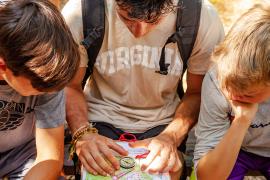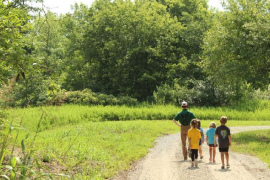In Part 1 of Your Values in Action During Uncertain Times, we offered thoughts on avoiding panic leadership, understanding stress, and returning to our values so that we can act instead with confidence for continuous growth amidst uncertainty. In Part 2 we invite you to use this uncertain time to take your values and put them “in action” to frame, invoke, define, and redefine the current (or any) crisis. This will make it easier to bring your staff on board and commit to a different summer while creating the culture your camp needs.
“When nothing is certain, everything is possible.” — Margaret Drabble
We believe staff culture and camp culture are tied together. They are not separate. The culture your staff embraces and models is your camp culture. Keeping our values front and center in our leadership and decision-making can help us bring our vision into focus on how to maintain this culture and create a better sense of our priorities. This will create a roadmap to keep our values in line throughout the process of planning for the summer knowing that uncertainty and flexibility are inevitable.
Instead of reinventing the wheel, we have chosen to look at Winston Churchill because he was known for coming alive as a leader during times of crisis (World War I, World War II, an economic crisis, and more). Stephen Mansfield authored The Character and Greatness of Winston Churchill: Hero in a Time of Crisis and spoke about him on a Building A Storybrand podcast, where he unpacked Churchill’s nine strategies for leading during a crisis. Here we take a dive into the first four strategies as they pertain to camp in order to narrow our focus, become more strategic, and ultimately be better at making decisions regarding staff.
Frame the Summer
In order to get staff to buy into a different summer, we must frame the crisis in a way that they can get their minds around it and act (commit). More so now than ever, this is relatively easy considering the alternative of being cooped up and stuck in a virtual world for days, weeks, and months on end. Kids don’t return to camp for activities. They come back for relationships. Spending a summer at camp provides connection and a caring community in a time when youth desperately need a healthy dose of both because they have been living in isolation. Staff can buy into that because they have also experienced it. The context is real. This is the stuff that will draw staff to and be dedicated to creating a positive camp culture.
In one of several student panels in the Southeast, a student/staffer so eloquently stated that “never has ‘I don’t know’ been uttered so much in a given period of time.” We have a golden opportunity to model for staff how to handle the unknown and be adaptable to whatever situation is thrown our way. It is OK not to have the answer to every question. Own it. Be transparent about it. This is the very thing that we want our staff to demonstrate for the campers. What better way than to learn from you!
We appreciate Churchill’s ability to lead by example. He was known to make sandwiches using the same rations as everyone else and shoot at enemy planes from the top of a building (not super effective, but he was taking action!) to show that everyone has to do their part. Of course, this is always important, but we find it to be especially true now. We have seen camps exhibit this from the past summer by having the leadership team dig in and do the “hard things” (lots of sanitizing and extra cleaning) along with everyone else.
Invoke Destiny
“Never let a good crisis go to waste.” — Winston Churchill
Churchill saw crisis as an opportunity. He believed that Great Britain would be stronger as a whole when the country got through to the other side of war, economic downturn, or some other calamity. Churchill put confidence in the British people that they were called to do this. He invoked their sense of destiny by telling them that “this can be our country’s finest hour. This is what we are made/ordained for. This is our generation’s greatest challenge.” Winston Churchill was a huge cheerleader for his country and people.
No argument from us that we are facing our generation's greatest challenge right now. By invoking staff to get on board for the coming summer, we are asking them to rise to the occasion of providing youth with experiences that bring them out of their isolation and offer ways for them to connect face-to-face with others in a caring and supportive community. Staff will know this to be right and true as they have been held prisoner in a virtual world themselves for the better part of a year. We can be cheerleaders for staff by invoking their emotions and inviting them to join the spirit of these crazy times.
Define Victory/Sucess
“Success is not final, failure is not fatal: it is the courage to continue that counts.” — Winston Churchill
Another way Churchill was able to get folks on board in hard times was to give them a view of the future. He would tell them how they would move past a war and earn a new world of hope for their children and grandchildren. Churchill instilled a sense of pride and gave people a role to play that would allow them to take part in determining their own destiny. People tend to head toward a vision if we can reverse engineer — lead backwards — through the steps to success.
We can do this by helping all staff understand why their being at camp is important, the compelling reason . . . their destiny. Use storytelling to define camp’s victory and bring it to life. Reverse engineer your camp’s story by answering the following questions (remembering that you do not have to have the answers). Invite staff to answer the questions collectively. Have them imagine themselves at a camp reunion five, 10, 20 years from now. What role do they play in getting to this point in the future? It is important not to make yourself the hero. Let staff be the heroes for summer 2021 (or any summer!).
- What does camp mean to us? To our staff/campers?
- How does being at camp impact the greater good of ourselves; our campers; the community; the world?
- Which camp traditions tie directly to our camp values?
- How does camp feel and look?
- What is our role in this story? Who is/are the hero(s)?
We have seen examples of success from camps who both opened or suspended programming in 2020. We can use these lessons to help define the success for the staff who will join us in 2021. One camp gave their staff a certificate at the end of the summer awarding them an “Associate Public Health Degree in Camp Safety.” By letting your staff “see” this accomplishment prior to the season, they can feel a sense of pride in what they will be undertaking. By having staff training in small cohorts as many camps did, it gives more folks an opportunity to be in a leadership position. This allows you to invite staff — other than you or the normal cast of characters — to take ownership in planning and executing the training necessary for a different summer.
We can invite staff to figure out overall camp challenges or those specific to their program area or camper life as a way to shine a beacon on success. Empower staff to problem-solve, regardless of how big or small, and assist with contingency plans for 2021 in ways that allow for choice in where/how they spend their energy. This may be bringing in folks early to do physical work (especially if finished with school in May), developing curriculum/lesson plans, creating adaptations for activities and special events, offering virtual programming for campers, enlisting social media hype, or brainstorming ideas for time off. Giving staff a say in some or all of these areas will pay off in the long run for their commitment to camp and happiness while at camp.
Redefine Hardship
“Things are not always right because they are hard, but if they are right one must not mind if they are also hard.” — Winston Churchill
There is a temptation to believe that anything hard is bad. Hard is not the enemy; rather, it is the thing that is going to make us better. Hardship is really the only thing that transforms us, gives us a sense of pride, and is an opportunity to become a better version of ourselves.
Yes, this coming summer will be hard (aren’t they all?!). Yes, there is a strong reality that we will have COVID-19-related implications such as shorter seasons, smaller numbers of campers, and limitations on the activity schedule. Yes, it is very possible that staff will have to quarantine before coming to camp and there will be restrictions on their time off. All of the hard stuff will call staff to their finest hour of becoming the best versions of themselves as they impact today’s youth and tomorrow’s leaders.
A return to our values puts down an anchor and acts as a compass to give us direction on where we are heading (crisis or not). Ironically, culture also reflects the “inaction” of values — if we are stuck and not putting our values to work, we go nowhere. Put one foot in front of the other. Taking baby steps is better than taking no steps. Your camp culture (and future!) depend on it.
“I never ‘worry’ about action, but only about inaction.” — Winston Churchill
Reference
Building a Storybrand with Donald Miller: Stephen Mansfield - 9 Secrets to Leading in a Crisis podcasts.apple.com/us/podcast/stephen-mansfield-nine-secrets-to-leading-during-a-crisis/id1092751338?i=1000470632287
This blog was written as part of Project Real Job’s initiative to support camps with staff recruiting, hiring, and retention efforts.
Jolly Corley, MS, works each summer developing 130 emerging leaders at Camp Robindel to create a dynamic and thoughtful camp culture through staff development. Using games, theatre and life experiences she prepares staff to understand that our own experiences are the most useful tools for reflection and growth to a solid foundation in becoming leaders for life. Her work takes her around the world providing training to develop a staff culture that promotes personal and professional growth. Check out jollycorley.com for more information.
Kim Aycock, MST, has 35+ years of experience developing young people with skills robots are unable to do. While blending the talents of a master teacher with the knowledge of a seasoned camp expert, Kim ignites the learning for varying levels of campers and staff worldwide. She has the ability to connect with and motivate learners of all ages through her interactive and innovative presentations (both in-person and virtually). Kim speaks professionally at regional and national conferences, contributes regularly to Camping Magazine and ACA blogs, and serves as Co-Chair of ACA’s Project Real Job Committee. More information can be found at: kimaycock.com.
Photo courtesy of URJ Crane Lake Camp, Lyndhurst, NJ
The views and opinions expressed by contributors are their own and do not necessarily reflect the views of the American Camp Association or ACA employees.




